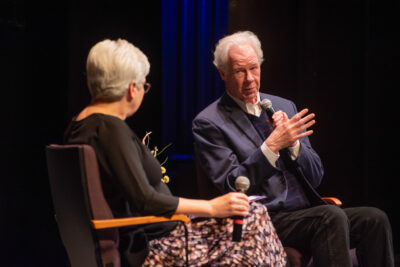Malinda Berry, professor of ethics at Anabaptist Mennonite Biblical Seminary, shared a message on Wednesday about the centrality of singing in the culture of Goshen College.
The message “Does the world still hear our song? Singing and Social Change” highlighted how Goshen, and the surrounding world, has changed and how attitudes around singing have changed as well.Berry, a GC graduate, shared that the most obvious change was the “mosaic of experiences” she was seeing standing at the podium.
“Goshen College didn’t look like this when I was a student,” she said. “So I’m here to offer back to you something of what I see when it comes to how Goshen College is changing and how those changes might be reflected.”
Events during Berry’s time as a student and then as a professor showed how important singing is to Goshen College. When she was a student in the mid-90s, GC celebrated its centennial with frequent renditions of the Alma Mater.
During her 2006-2009 stint as a faculty member, two debates were happening on campus: an informal debate of the practice of singing, specifically four-part a cappella, as per the Mennonite tradition, and a debate on whether the national anthem should be played at GC sporting events.
“I think that became an incredibly painful time for Goshen College,” Barry said. “Isn’t it interesting that these two debates seem to be about hospitality and the changing student body here at Goshen College but they were also about music and singing and the kinds of songs that Goshen College values and creates?”
This realization reminded Berry of her first visits to Goshen College as a first grader for weekly piano classes where she learned the fundamentals of playing piano and reading music. As she grew older and found a love for congregational song leading, she realized how intertwined music and Mennonite identity are. This impacted the way she thought about the two debates surrounding music at Goshen.
“I paid attention to how I was responding to these debates,” said Berry. “On the one hand, I was incredibly defensive. I felt like my worldview was under attack.”
Berry said that music shapes culture and identity, and the culture of Goshen College surrounding music can be shared. “To teach someone how to do something. . . is a humbling experience,” she said.
According to Berry, four-part harmony can be thought of as a metaphor for the liberal arts.
“If we start off with general education courses, this is a way of learning the melody,” she said. “And then some of us decide to we want to be physics majors. Some of us decide we want to be art majors. Some of us decide we want to be historians or English majors. That’s taking the melody and the discipline and learning how to harmonize — how to make it more complex.”
Berry led the room in verse two of hymn 548 in “Hymnal: A worship book.” This hymn is one that was written by Goshen College faculty.
“This song belongs to each of you,” she said.
At the end of the chapel, the Student Ministry Team encouraged students to come to the front and write inspirational or transformative song lyrics on poster board that were hung up outside the chapel.




